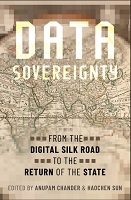Data Sovereignty
From the Digital Silk Road to the Return of the State
Contributor(s)
Chander, Anupam (editor)
Sun, Haochen (editor)
Language
EnglishAbstract
Digital sovereignty—the exercise of control over the Internet—is the ambition of the world’s leaders, from Australia to Zimbabwe, a bulwark against both foreign state and foreign corporation. Governments have resoundingly answered first-generation Internet law questions of who if anyone should regulate the Internet—they all will. The second-generation question to confront is not whether, but how to regulate the Internet. This volume features new theoretical perspectives on digital sovereignty and explores cutting-edge issues associated with it. Drawing mainly on various theories concerning political economy, international law, human rights, and data protection, it presents thought-provoking ideas about the nature and scope of digital sovereignty. It also examines the extent to which new technological developments in sectors, such as artificial intelligence, e-commerce, and sharing economy, have posed challenges to assertion of digital sovereignty, and considers how to deal with such challenges. In particular, the volume discusses the promise and pitfalls of digital sovereignty in the process of trade liberalization, data localization, and human rights protection.


 Download
Download Web Shop
Web Shop